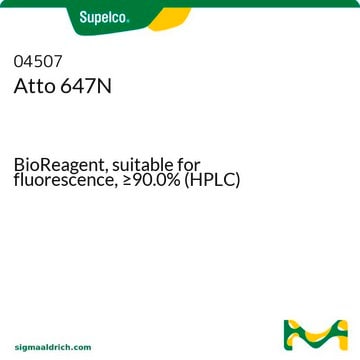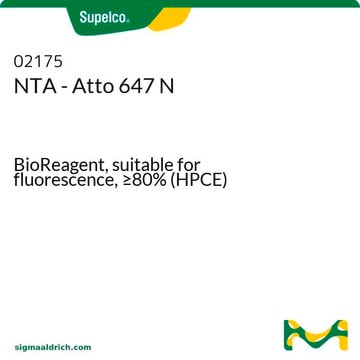18373
Atto 647N NHS ester
BioReagent, suitable for fluorescence, ≥90% (HPLC)
Sign Into View Organizational & Contract Pricing
All Photos(1)
About This Item
Recommended Products
product line
BioReagent
Assay
≥90% (HPLC)
≥90% (degree of coupling)
form
solid
manufacturer/tradename
ATTO-TEC GmbH
λ
in ethanol (with 0.1% trifluoroacetic acid)
UV absorption
λ: 641-647 nm Amax
suitability
suitable for fluorescence
storage temp.
−20°C
Related Categories
General description
Atto 647N is a superior red-emitting fluorescence dye with a strong absorption, excellent fluorescence quantum yield (65%), high photostability, excellent ozone resistance, good solubility, and very little triplet formation.
Application
Atto 647N belongs to a new generation of fluorescent labels for the red spectral region. The dye is designed for application in the area of life science, e.g. labeling of DNA, RNA or proteins. Characteristic features of the label are strong absorption, excellent fluorescence quantum yield, high photostability, excellent ozone resistance, good solubility, and very little triplet formation. Atto 647N is a cationic dye. The active ester of Atto 647N fluorescence dye reacts with amino groups under mild conditions. After coupling to a substrate the dye carries a net electrical charge of +1. In common with most Atto-labels, absorption and fluorescence are independent of pH in the range of 2 to 11, used in typical applications. As supplied Atto 647N consists of a mixture of two isomers with practically identical absorption and fluorescence properties.
Legal Information
This product is for Research use only. In case of intended commercialization, please contact the IP-holder (ATTO-TEC GmbH, Germany) for licensing.
related product
Product No.
Description
Pricing
Storage Class Code
11 - Combustible Solids
WGK
WGK 3
Personal Protective Equipment
dust mask type N95 (US), Eyeshields, Gloves
Certificates of Analysis (COA)
Search for Certificates of Analysis (COA) by entering the products Lot/Batch Number. Lot and Batch Numbers can be found on a product’s label following the words ‘Lot’ or ‘Batch’.
Already Own This Product?
Find documentation for the products that you have recently purchased in the Document Library.
Customers Also Viewed
Jialei Tang et al.
Scientific reports, 7(1), 10945-10945 (2017-09-10)
We report a simple single-molecule fluorescence imaging method that increases the temporal resolution of any type of array detector by >5-fold with full field-of-view. We spread single-molecule spots to adjacent pixels by rotating a mirror in the detection path during
Shangguo Hou et al.
Nature communications, 11(1), 3607-3607 (2020-07-19)
To date, single molecule studies have been reliant on tethering or confinement to achieve long duration and high temporal resolution measurements. Here, we present a 3D single-molecule active real-time tracking method (3D-SMART) which is capable of locking on to single
Ioannis Sgouralis et al.
The journal of physical chemistry. B, 123(3), 675-688 (2018-12-21)
We develop a Bayesian nonparametric framework to analyze single molecule FRET (smFRET) data. This framework, a variation on infinite hidden Markov models, goes beyond traditional hidden Markov analysis, which already treats photon shot noise, in three critical ways: (1) it
Christian Eggeling et al.
Nature, 457(7233), 1159-1162 (2008-12-23)
Cholesterol-mediated lipid interactions are thought to have a functional role in many membrane-associated processes such as signalling events. Although several experiments indicate their existence, lipid nanodomains ('rafts') remain controversial owing to the lack of suitable detection techniques in living cells.
Ardina Grüber et al.
PloS one, 5(2), e9146-e9146 (2010-02-18)
Invasion of the red blood cells (RBC) by the merozoite of malaria parasites involves a large number of receptor ligand interactions. The reticulocyte binding protein homologue family (RH) plays an important role in erythrocyte recognition as well as virulence. Recently
Our team of scientists has experience in all areas of research including Life Science, Material Science, Chemical Synthesis, Chromatography, Analytical and many others.
Contact Technical Service




